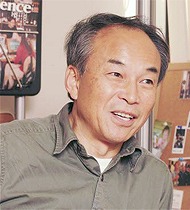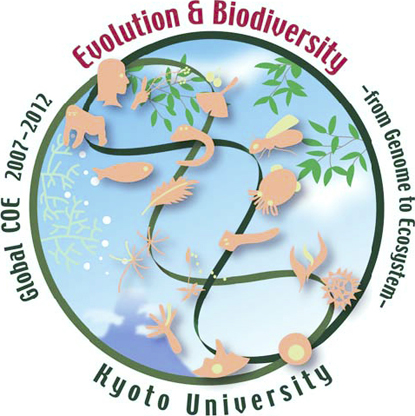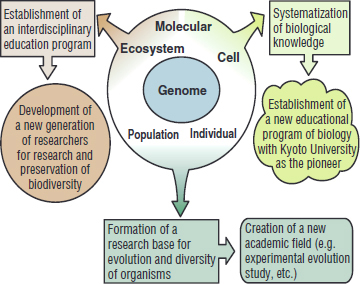Global COE Programs
Formation of a Strategic Base for Biodiversity and Evolutionary Research: From Genome To Ecosystem

Program Leader :
Prof. Kiyokazu AGATA
While in the 20th century researchers tried to discover the general basic principles of organisms, in the early 21st century researchers are striving to understand the evolution and diversity of organisms on the basis of said principles by integrating morphology, physiology, ecology, and other disciplines.
The chief difficulty in studying the evolution and diversity of organisms lies in the need to consider factors ranging from the tiny genome to the entire ecosystem. As dealing with multiple factors can create a loss of focus, researchers have typically narrowed their sights to one level or factor at a time. Unfortunately, the research and education system that developed in response to this compartmentalized approach is inadequate for incisively studying the evolution and diversity of organisms.
To solve these problems, Kyoto University's Department of Zoology, Department of Botany, Department of Biophysics, Primate Research Institute, and Center for Ecological Research of the Graduate School of Science organized a 21st Century COE program team that strongly emphasized exchanges of studies and integration of the education programs between micro-level biology (genomic science, evolutionary developmental biology, genetic science, cell biology, neurobiology, molecular physiology, and molecular evolutionary study) and macro-level biology (primatology, anthropology, ethology, environmental biology, evolutionary taxonomy, and so on). We promoted exchanges of studies at various levels, including inter-laboratory seminar programs. We have succeeded in initiating pioneering studies of biodiversity.
To build on the progress of the current 21st Century COE Program, we are planning the following projects as our Global COE.
- Making breakthroughs in the study of evolution and the diversity of life, and establishing an international base of research of evolution and biodiversity
- Establishing a new educational program and training a new generation of researchers capable of such breakthroughs
- Promoting the systematization of biological knowledge
We are also planning to enhance education programs for biodiversity study. With the advent of the "genome century," a new curriculum to be organized for biology students will teach competence in the manipulation of genome data. Laboratories for genome education are in the planning phase. We are renovating the Botanical Garden located in Kyoto University's northern campus into a research education facility for a program uniting genome science and field science.
These activities will help us construct an international base for experimental evolutionary biology that will blaze a trail globally.



